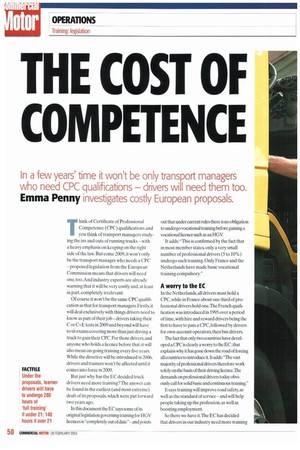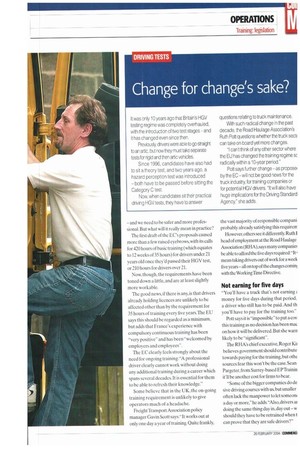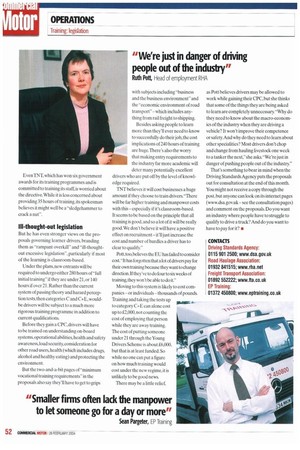THE COST OF COMPETENCE
Page 50

Page 51

Page 52

If you've noticed an error in this article please click here to report it so we can fix it.
In a few years' time it won't be only transport managers who need CPC qualifications — drivers will need them too.
Emma Penny investigates costly European proposals.
Think of Certificate of Professional Competence (CPC) qualifications and you think of transport managers studying the ins and outs of running trucks with a heavy emphasis on keeping on the right side of the law. But come 2009, it won't only be the transport manager who needs a CPC -proposed legislation from the European Commission means that drivers will need one, too.And industry experts are already warning that it will be very costly and, at least in part. completely irrelevant.
Of course it won't be the same CPC qualification as that for transport managers. Firstly, it will deal exclusively with things drivers need to know as part of their job drivers taking their C or C+E tests in 2009 and beyond will have to sit exams covering more than just driving a truck to gain their CPC. For those drivers, and anyone who holds a licence before that, it will also mean on-going training every five years. While the directive will be introduced in 2006. drivers and trainees won't be affected until it comes into force in 2009.
But just why has the EC decided truck drivers need more training? The answer can be found in the earliest (and most extreme) draft of its proposals, which were put forward two years ago.
In this document the EC says some of its original legislation governing training for HGV licences is "completely out of date"-and points out that under current rules there is no obligation to undergo vocational training before gaining a vocational licence such as an HGV.
It adds:-This is confirmed by the fact that in most member states, only a very small number of professional drivers (5 to 10%) undergo such training. Only France and the Netherlands have made basic vocational training compulsory."
A worry to the EC
In the Netherlands, all drivers must hold a CPC, while in France about one third of professional drivers hold one.The French qualification was introduced in 1995 over a period of time, with hire and reward drivers being the first to have to pass a CPC, followed by drivers for own-account operators, then bus drivers.
The fact that only two countries have developed a CPC is clearly a worry to the EC ;that explains why it has gone down the road of forcing all countries to introduce it. It adds:-The vast majority of professional drivers therefore work solely on the basis of their driving licencelhe demands on professional drivers today obviously call for solid basic and continuous training."
It says training will improve road safety, as well as the standard of service and will help people taking up the profession. as well as boosting employment.
So there we have it.The EC has decided that drivers in our industry need more training — and we need to be safer and more professional, But what will it really mean in practice?
The first draft of the EC's proposals caused more than a few raised eyebrows, with its calls for 420 hours of basic training (which equates to 12 weeks of 35 hours) for drivers under 21 years old once they'd passed their HGV test, or 210 hours for drivers over 21.
Now, though. the requirements have been toned down a little, and are at least slightly more workable.
The good news, if there is any,is that drivers already holding licences are unlikely to be affected other than by the requirement for 35 hours of training every five years. The EU says this should be regarded as a minimum, but adds that France's experience with compulsory continuous training has been "very positive" and has been "welcomed by employers and employees".
The EC clearly feels strongly about the need for ongoing training:"A professional driver clearly cannot work without doing any additional training during a career which spans several decades. It is essential for them to be able to refresh their knowledge."
Some believe that in the UK, the on-going training requirement is unlikely to give operators much of a headache.
Freight Transport Association policy manager Gavin Scott says:It works out at only one day a year of training. Quite frankly. the vast majority of responsible compani probably already satisfying this requirerc However,others see it differently. Ruth I head of employment at the Road Haulage Association (RHA),says many companie be able to afford the five days required:"It mean taking drivers out of work for a week five years—all on top of the changes comirq with the WorkingTime Directive.
Not earning for five days
You'll have a truck that's not earning money for five days during that period, a driver who still has to be paid. And th you'll have to pay for the training too." Pott says it is "impossible" to put a cos: this training as no decision has been mac on how it will be delivered. But she warn likely to be "significant".
The RHA's chief executive, Roger Kit believes government should contribute towards paying for the training, but othe sources fear this won't be the case. Sean Pargeter, from Surrey-based EPTrainin it'll be another cost for firms to bear.
"Some of the bigger companies do de sive driving courses with us, but smaller often lack the manpower to let someorm a day or more," he adds."Also, drivers at doing the same thing day in, day out — w should they have to be retrained when t can prove that they are safe drivers?" Even TNT, which has won six government awards for its training programmes and is committed to training its staff, is worried about the directive. While it is less concerned about providing 35 hours of training, its spokesman believes it might well be a "sledgehammer to crack a nut".
11l-thought-out legislation
But he has even stronger views on the proposals governing learner drivers, branding them as "rampant overkill" and "ill-thoughtout excessive legislation-, particularly if most of the learning is classroom-based.
Under the plans, new entrants will be required to undergo either 280 hours of "full initial training" if they are under 21, or 140 hours if over 21. Rather than the current system of passing theory and hazard perception tests, then categories C and C+E. wouldbe drivers will be subject to a much more rigorous training program= in addition to current qualifications.
Before they gain a CPC, drivers will have to be trained on understanding on-board systems. operational abilities, health and safety awareness, load security, consideration for other road users, health (which includes drugs, alcohol and healthy eating) and protecting the environment.
But the two-and-a-bit pages of"minimum vocational training requirements" in the proposals also say they'll have to get to grips with subjects including "business and the business environment" and the "economic environment of road transport"-which includes anything from rail freight to shipping.
Besides asking people to learn more than they'll ever need to know to successfully do their job, the cost implications of 240 hours of training are huge.There's also the worry that making entry requirements to the industry far more academic will deter many potentially excellent drivers who are put off by the level of knowledge required.
TNT believes it will cost businesses a huge amount if they choose to train drivers."There will be far higher training and manpower costs with this especially if it's classroom-based. It seems to be based on the principle that all training is good, and so a lot of it will be really good. We don't believe it will have a positive effect on recruitment it'll just increase the cost and number of hurdles a driver has to clear to qualify."
Pott,too,believes the EU has failed to consider cost."It has forgotten that a lot of drivers pay for their own training because they want to change direction. If they've to do four to six weeks of training,they won't be able to do it."
Moving to this system is likely to cost companies -or individualsthousands of pounds. 'Raining and taking the tests up to category C+E can alone cost up to £2,000, not counting the cost of employing that person while they are away training. The cost of putting someone under 21 through the Young Drivers Scheme is about £6,000, but that is at least funded. So while no one can put a figure on how much training would cost under the new regime. it is unlikely to be good news.
There may be a little relief, as Pott believes drivers may be allowed to work while gaining their CPC, but she thinks that some of the things they are being asked to learn are completely unnecessary. -Why do they need to know about the macro-economics of the industry when they are driving a vehicle? It won't improve their competence or safety. And why do they need to learn about other specialities? Most drivers don't chop and change from hauling livestock one week to a tanker the next," she asks."We're just in danger of pushing people out of the industry."
That's something to bear in mind when the Driving Standards Agency puts the proposals out for consultation at the end of this month. You might not receive a copy through the post, but anyone can look on its intemet pages (www.dsa.gov.uk see the consultation pages) and comment on the proposals Do you want an industry where people have to struggle to qualify to drive a truck? And do you want to have to pay font? • CONTACTS Driving Standards Agency: 0115 901 2500; www.dsa.gov.uk Road Haulage Association: 01932 841515; www.rha.net Freight Transport Association: 01892 552222; www.tta.co.uk EP Training: 01372 450800; www.eptraining.co.uk






























































































































































































